Module 4 Unit 1 Do you want some rice 课件(内含音频可直接播放)20张
文档属性
| 名称 | Module 4 Unit 1 Do you want some rice 课件(内含音频可直接播放)20张 | 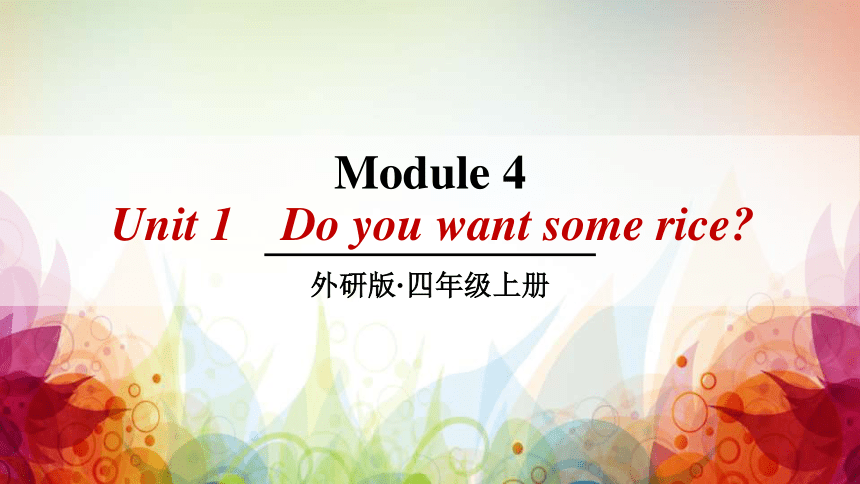 | |
| 格式 | zip | ||
| 文件大小 | 15.4MB | ||
| 资源类型 | 教案 | ||
| 版本资源 | 外研版(三年级起点) | ||
| 科目 | 英语 | ||
| 更新时间 | 2018-09-29 18:23:38 | ||
图片预览

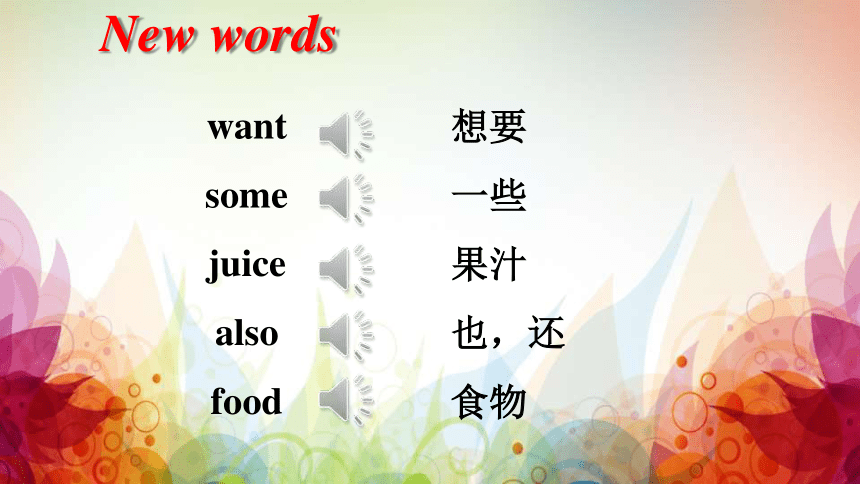
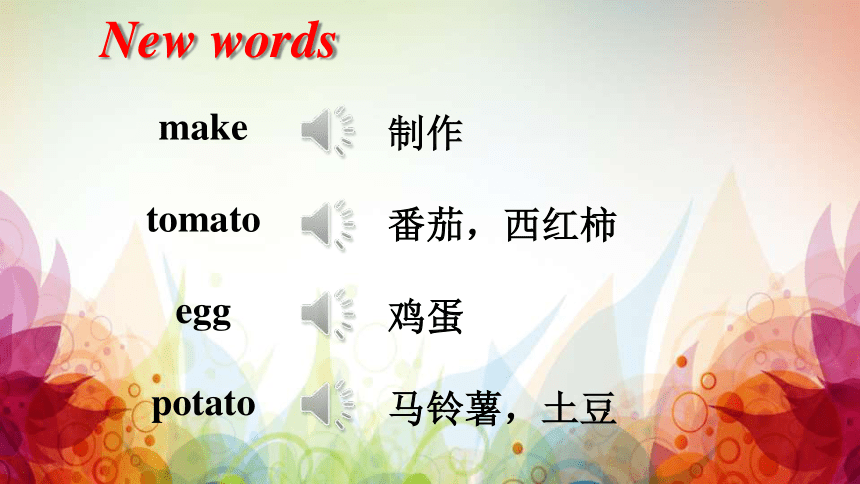

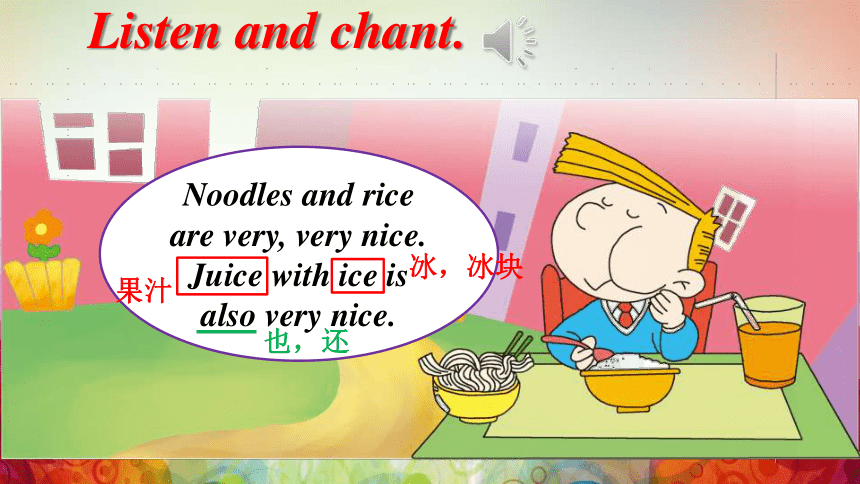
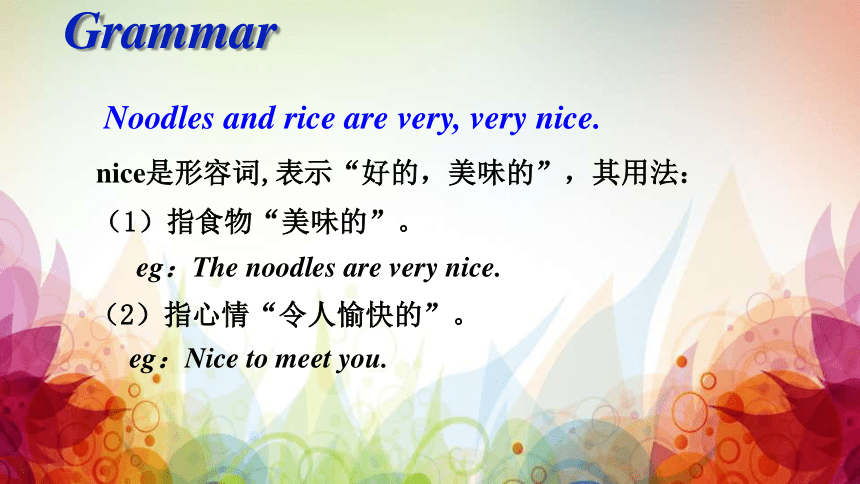
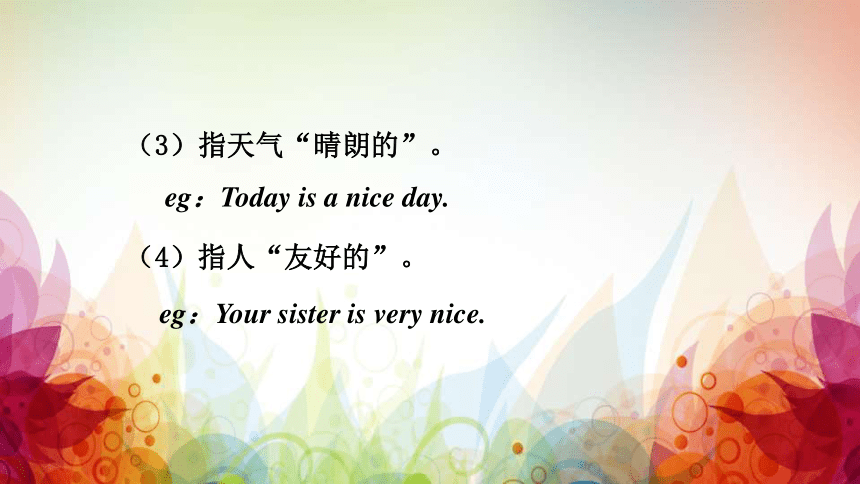
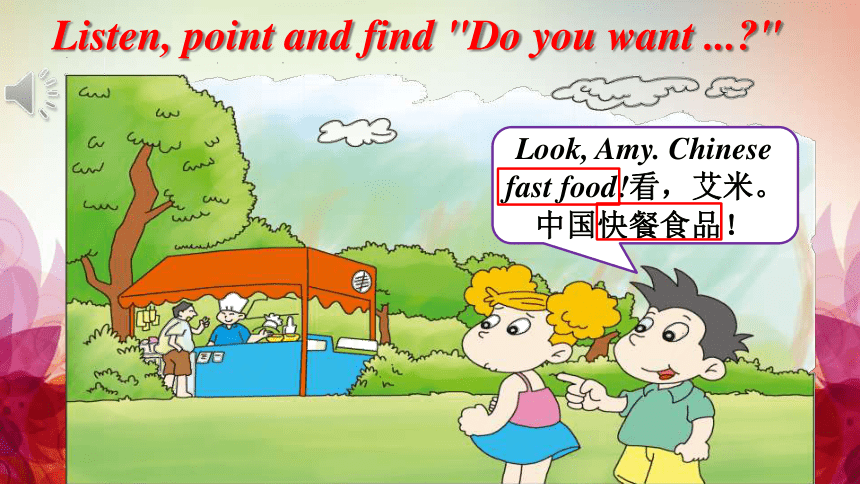
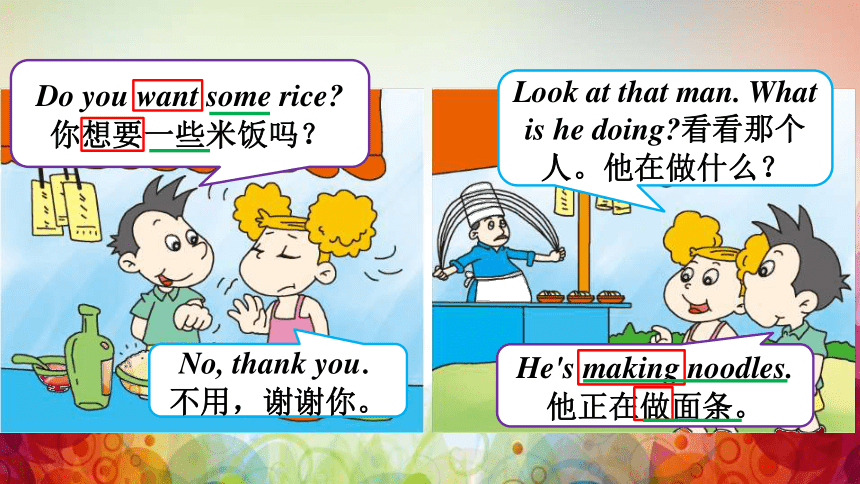
文档简介
课件20张PPT。Module 4外研版·四年级上册Unit 1 Do you want some rice?New wordswant
some
juice
also
food想要
一些
果汁
也,还
食物New wordsmake
tomato
egg
potato制作
番茄,西红柿
鸡蛋
马铃薯,土豆Listen and chant.Noodles and rice are very, very nice. Juice with ice is also very nice.果汁也,还冰,冰块Noodles and rice are very, very nice.nice是形容词,表示“好的,美味的”,其用法:(1)指食物“美味的”。(2)指心情“令人愉快的”。 eg:The noodles are very nice.eg:Nice to meet you.Grammar(3)指天气“晴朗的”。 (4)指人“友好的”。 eg:Today is a nice day.eg:Your sister is very nice.Listen, point and find "Do you want ...?"Look, Amy. Chinese fast food!看,艾米。中国快餐食品!Do you want some rice?你想要一些米饭吗?No, thank you.
不用,谢谢你。Look at that man. What is he doing?看看那个人。他在做什么?He's making noodles.他正在做面条。Do you want some noodles?你要一些面条吗?Yes, please.是的。Here are noodles with tomato and egg, and noodles with meat and potato. What do you want?这里有西红柿鸡蛋面和土豆炖肉面,你要哪个?Noodles with tomato and egg, please.
西红柿鸡蛋面。西红柿鸡蛋面Mm, it's nice!
嗯,好吃!Grammar Do you want some rice? (1)want的意思是“想要”,后接名词、代词、动词不定式作宾语。后面接名词、代词时,意思是“想要……”;后面接不定式,即want to do sth. (想要做某事) 或want sb. to do sth.
(想要某人做某事)。eg:I want to have a birthday party. (2)some和any都表示“一些”,都可以修饰可数名词的复数和不可数名词,其区别是:
①some常用于肯定句中。
eg:There are some students in the classroom.
②any常用于疑问句或否定句中。
eg:There isn't any water on the table.Do you want some noodles? 句型“Do you want…?”意思是“你想要……吗?”,常用于就餐时询问对方是否想吃某种食物。
do是助动词,没有实际意义,其肯定回答是:Yes, please. (是的,请来一些。);否定回答是No, thank you.(不用了,谢谢。)eg:—Do you want some bananas?
—Yes,please.Listen and say.Do you want some noodles?No, thank you.Do you want some milk?Yes, please.Practise.Do you want some noodles?Yes, please.Do you want some noodles?No, thank you.Do you want some milk?Yes, please.Do you want some fish?No, thank you.Exercise 汉译英。 1.中式快餐 _________________
2.做面条 __________________
3.西红柿鸡蛋面 _________________________
4.看这个男人 ___________________Chinese fast foodmake noodlesnoodles with tomato and egg look at the man
some
juice
also
food想要
一些
果汁
也,还
食物New wordsmake
tomato
egg
potato制作
番茄,西红柿
鸡蛋
马铃薯,土豆Listen and chant.Noodles and rice are very, very nice. Juice with ice is also very nice.果汁也,还冰,冰块Noodles and rice are very, very nice.nice是形容词,表示“好的,美味的”,其用法:(1)指食物“美味的”。(2)指心情“令人愉快的”。 eg:The noodles are very nice.eg:Nice to meet you.Grammar(3)指天气“晴朗的”。 (4)指人“友好的”。 eg:Today is a nice day.eg:Your sister is very nice.Listen, point and find "Do you want ...?"Look, Amy. Chinese fast food!看,艾米。中国快餐食品!Do you want some rice?你想要一些米饭吗?No, thank you.
不用,谢谢你。Look at that man. What is he doing?看看那个人。他在做什么?He's making noodles.他正在做面条。Do you want some noodles?你要一些面条吗?Yes, please.是的。Here are noodles with tomato and egg, and noodles with meat and potato. What do you want?这里有西红柿鸡蛋面和土豆炖肉面,你要哪个?Noodles with tomato and egg, please.
西红柿鸡蛋面。西红柿鸡蛋面Mm, it's nice!
嗯,好吃!Grammar Do you want some rice? (1)want的意思是“想要”,后接名词、代词、动词不定式作宾语。后面接名词、代词时,意思是“想要……”;后面接不定式,即want to do sth. (想要做某事) 或want sb. to do sth.
(想要某人做某事)。eg:I want to have a birthday party. (2)some和any都表示“一些”,都可以修饰可数名词的复数和不可数名词,其区别是:
①some常用于肯定句中。
eg:There are some students in the classroom.
②any常用于疑问句或否定句中。
eg:There isn't any water on the table.Do you want some noodles? 句型“Do you want…?”意思是“你想要……吗?”,常用于就餐时询问对方是否想吃某种食物。
do是助动词,没有实际意义,其肯定回答是:Yes, please. (是的,请来一些。);否定回答是No, thank you.(不用了,谢谢。)eg:—Do you want some bananas?
—Yes,please.Listen and say.Do you want some noodles?No, thank you.Do you want some milk?Yes, please.Practise.Do you want some noodles?Yes, please.Do you want some noodles?No, thank you.Do you want some milk?Yes, please.Do you want some fish?No, thank you.Exercise 汉译英。 1.中式快餐 _________________
2.做面条 __________________
3.西红柿鸡蛋面 _________________________
4.看这个男人 ___________________Chinese fast foodmake noodlesnoodles with tomato and egg look at the man
同课章节目录
- Module 1
- Unit 1 Go straight on.
- Unit 2 It's at the station.
- Module 2
- Unit 1 She's reading a book.
- Unit 2 What are you doing?
- Module 3
- Unit 1 What are they doing?
- Unit 2 What's the elephant doing?
- Module 4
- Unit 1 Do you want some rice?
- Unit 2 How much is it?
- Module 5
- Unit 1 Can you ran fast?
- Unit 2 Can Sam play football?
- Module 6
- Unit 1 Can I have some sweets?
- Unit 2 Happy Halloween!
- Module 7
- Unit 1 There is a horse in this photo.
- Unit 2 There are twelve boys on the bike.
- Module 8
- Unit 1 We're going to visit Hainan.
- Unit 2 Sam is going to ride horse.
- Module 9
- Unit 1 Are you going to run on Sports Day?
- Unit 2 I'm going to do the high jump.
- Module 10
- Unit 1 We have a big family dinner.
- Unit 2 Merry Christmas!
- Review Module
- Unit 1
- Unit 2
